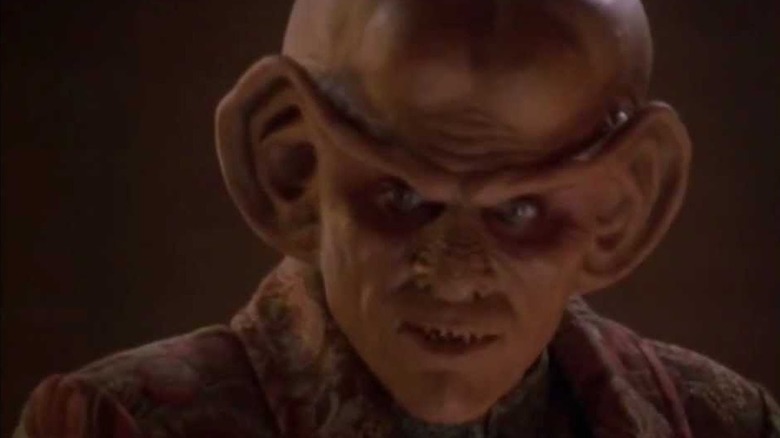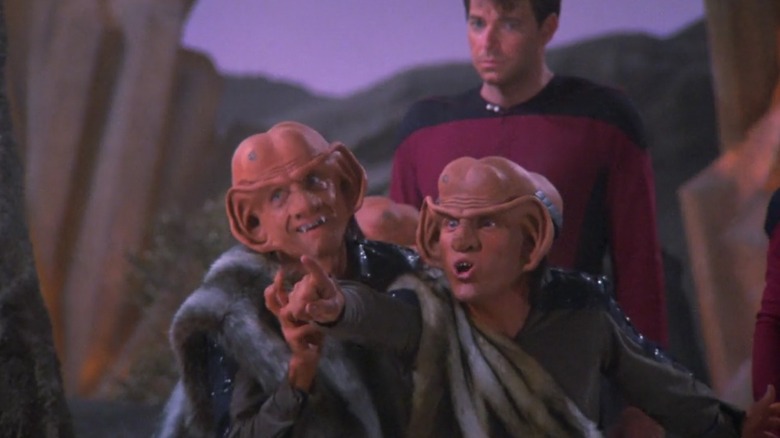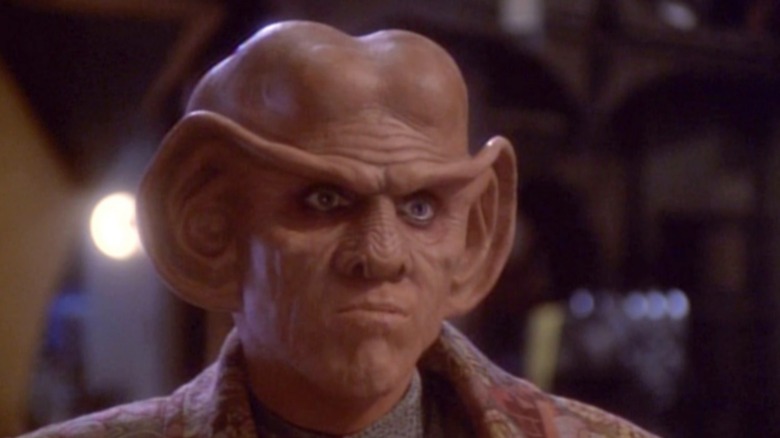Armin Shimerman Hoped Quark Could Correct A Major Star Trek Misstep
In the first few episodes of "Star Trek: The Next Generation," the Ferengi were spoken of in hushed tones. A new, mysterious, malevolent species had come to power in the span between "Star Trek" and its 1987 sequel series, and they promised to be a galactic threat on the level of well-known Trek baddies like the Klingons or the Romulans. In the first four episodes of the show, allusions would be made to the Ferengi's power and tendency toward violence. In the pilot episode, "Encounter at Farpoint," it was implied that the Ferengi were cannibals who would eat their victims. This was, however, likely a flip joke on the part of Captain Picard.
The Ferengi finally made their first appearance on screen in the fifth episode of "The Next Generation," entitled "The Last Outpost." In that episode, the Enterprise and a Ferengi vessel they are meeting for the first time suffer a catastrophic power loss. Investigation reveals the power drain has something to do with an ancient, abandoned outpost on the surface of the planet both ships are orbiting. William Riker (Jonathan Frakes) leads an away team to the planet, where they are confronted by a trio of Ferengi (including one played by actor Armin Shimerman) who snarl and hiss and stun the Enterprise crew with energy whips, a weapon that would be used infrequently in "Star Trek" moving forward.
After the tussle, both parties are approached by a mysterious, aggressive sentry (Darryl Henriques) who appears from an ancient crystal. He announces he is from the Tkon Empire, and that his species rules the galaxy. Riker calmly explains that the sentry's species went extinct millennia ago, and that he was guarding an outpost that had been empty for many, many generations. As soon as the Tkon sentry appears, the Ferengi immediately begin sniveling and ingratiating themselves, toadying up to the seemingly powerful being. Riker and the Tkon sentry talk about how the Ferengi are merely children in their evolution, and that they should be left alone to grow up at their own pace. A species that was meant to be a grave threat was reduced to pathetic comedy characters.
In an interview with Gamespot, Shimerman — who would go on to play the Ferengi character of Quark, one of the regular cast on "Star Trek: Deep Space Nine" — reveals that "The Last Outpost" was a "disaster," and he felt that he "failed miserably." It took him years of playing Quark to wash the taste of that one episode out of his mouth.
'I failed miserably'
Shimerman recalls well the mandates given by Gene Roddenberry, and the way the Ferengi were supposed to be depicted in "The Last Outpost":
"Well, what we were told about the Ferengi and what we ended up with were like night and day. The Ferengi were going to be the new Klingons. They were never meant to be a comical race; they were meant to be ferocious and menacing. And unfortunately, they hired me to play one of the lead Ferengi, and I failed miserably."
Indeed, Shimerman recalls meeting Gene Roddenberry himself, also — rather unfortunately — noting his disappointment:
"My final performance was not at all what Gene Roddenberry wanted. By that point, he was rather sick, and he was not on set. But I met him briefly — maybe no more than 30 seconds — when he looked at my makeup and looked at my costume. 'The Last Outpost' was a disaster. And no one bears the brunt of that mistake more than I do."
Shimerman would play a small role in another episode of "Star Trek: The Next Generation" (as a talking robotic crate in the episode "Haven") before being cast as Quark on "Deep Space Nine." He was playing another Ferengi character, and admits that much of his performance as Quark was informed by the disappointment he felt over "The Last Outpost":
"I didn't put it behind me for years; it was like sword of Damocles hanging over my head. All of my work on 'Deep Space Nine,' for the first four seasons, was me trying to eradicate that original performance from everyone's mind. It was my personal agenda to rectify the mistake I made; to take a one-dimensional character and make him a three-dimensional character."
The arc of Quark
This must have stung Shimerman, as he admits to watching "Star Trek," and being a fan of the 1966 TV show:
"I was a huge 'Star Trek' fan. I watched the original show when it aired. As a young man, I would rush home to make sure I caught every episode. And for the first year [of Deep Space Nine], other members of the cast would come up to me and ask me questions. I remember one person — I can't remember who — came up to me and said, 'Armin, you know about this. What's a Klingon?'"
Shimerman also talked about the legacy of "The Last Outpost" in a 2019 interview with TrekMovie. In that interview, he used the word "rehabilitation" to describe what he was doing with Quark. When asked if that was an explicit goal of his, Shimerman was frank:
"From my point of view, yes, and from all the kind things that have been said about the Ferengi as opposed to what I did — and primarily it was my mistakes — in that first episode of 'TNG.' But the rehabilitation wasn't all me. It certainly had to do with Aron [Eisenberg]'s portrayal of Nog, Max [Grodénchik]'s portrayal of Rom, with Cecily [Adams]' portrayal as Moogie. All of those actors together helped rehabilitate this particular culture. And of course, we couldn't have done it without the writers, who created all those stories. I think we did rehabilitate the race and I take full responsibility for the race being founded on such weak premises."
Over the course of "Deep Space Nine," audiences got to know Ferengi culture very well. Taking a page from Ayn Rand, the Ferengi were a species devoted to money and acquisition. Their belief structures all stemmed from accruing wealth, and their afterlife was predicated on paying your way in. Quark was a stalwart businessman whose devotion to wealth carried with it a kind of admirable integrity. Quark became one of the most principled characters on the show, even if his principles didn't necessarily match the Starfleet ideal of self-betterment and compassion. Even as Ferengi culture evolved (it is a brazenly sexist society as well, with women forced to literally stay naked and quiet), Quark remained steadfast. Late in the series, he even bellows "This far and no further!" He will not let changing times change his own beliefs.
The Ferengi were never the threatening villains that the early episodes of "Next Generation" might have you believe, but instead turned into something far more fascinating. Ferengi were often comedy characters, but, given the time to expand and seasons of TV to explore, audiences eventually got to know so much more. Shimerman most certainly succeeded in his goal, and it's a testament to the actor's talent that Trekkies can think of Ferengi in such a positive light today.


